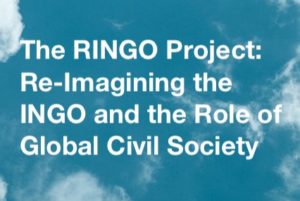Key takeaways from RINGO’s session at the Catalyst 2030 Catalysing Change Week 2024
Most agree that we want to shift power to communities, but where is the money? Business as usual isn’t going to cut it. Catalysing change to achieve the SDGs requires creative new funding models that empower and strengthen local civil society to drive community-based development.
In May 2024, RINGO’s Deborah Doane facilitated a session at Catalysing Change Week with guest speakers Riva Kantowitz (Radical Flexibility Fund), Charlotte Timson (Transform Trade) and Juan Lozano (Innpactia) to explore new resourcing models to shift power and amplify community impact.
Developing new funding models requires a shift in thinking and practice: moving from investing in ‘outcomes’ to investing in people and processes. Shifting power to communities through new, equitable, and sustainable resourcing mechanisms necessitates deeper trust, mutual accountability, and risk-sharing. Drawing from the experience of the RINGO Project’s prototype on participatory grant-making and the Radical Flexibility Fund’s approach to community-centred innovative finance for development, the session involved a deep dive into these new models and ideas for more collaboration in the ecosystem, especially from the funding sector.
Here are some key takeaways:
- The perceived scarcity of resources at a macro level can have an effect on the psychology of people working in this sector – but innovations around shifting power are happening across the ecosystem.
- A seed was planted during the pandemic that saw donors making quick decisions around funding, taking more risk, and putting people before procedures.
- Analysis shows people are interested in using private markets to support innovation: impact investment, social impact bonds, thematic bonds, results based payments, collective pooled funding.
- Learnings from adopting a participatory grantmaking approach: We need to invest in processes, relationships and communities. This means we need to shift our mindsets away from quick results and sequential outcomes, and go at the pace of our partners.
- Don’t underestimate how old fashioned metrics perpetuates the power imbalance. Consider who needs to understand the impact. Ask the communities: what does success look like to you? How impactful is this process? How impactful is our way of working?
- Traditional (control based) versus agile (trust based) methodologies: Taking an agile approach allows greater flexibility and engagement.
- Courageous leadership is needed to mobilise resources in ways that are perceived to be risky.
- Many are afraid of the risks of change… and do not realise the risk we are taking by not changing the ways we mobilise financial capital to impact.
- Being systematically better connected would allow us to build a culture around trust with a long term perspective: the SDGs won’t be achieved overnight, we need different impact measures and greater flexibility.
Calls to action
The session closed with recommendations from the panel:
- Juan: There are resources out there: let’s bring new players and money into the game. We need to tell the story that these new actors can make a difference.
- Charlotte: We need to support organisations to thrive rather than survive by providing flexible, long term funding. Also consider the quality of the funding: more is not always better – the aim is to establish a strong solid foundation for real and lasting change.
- Riva: Funders’ mandates should include making connections amongst the donor community to support our partners.
- Deborah: It is much more risky to not invest in communities and allow them to drive their own sustainability agenda. We need more funding and power at the local level.
Watch the full session here:
Photo by 愚木混株 cdd20 on Unsplash
